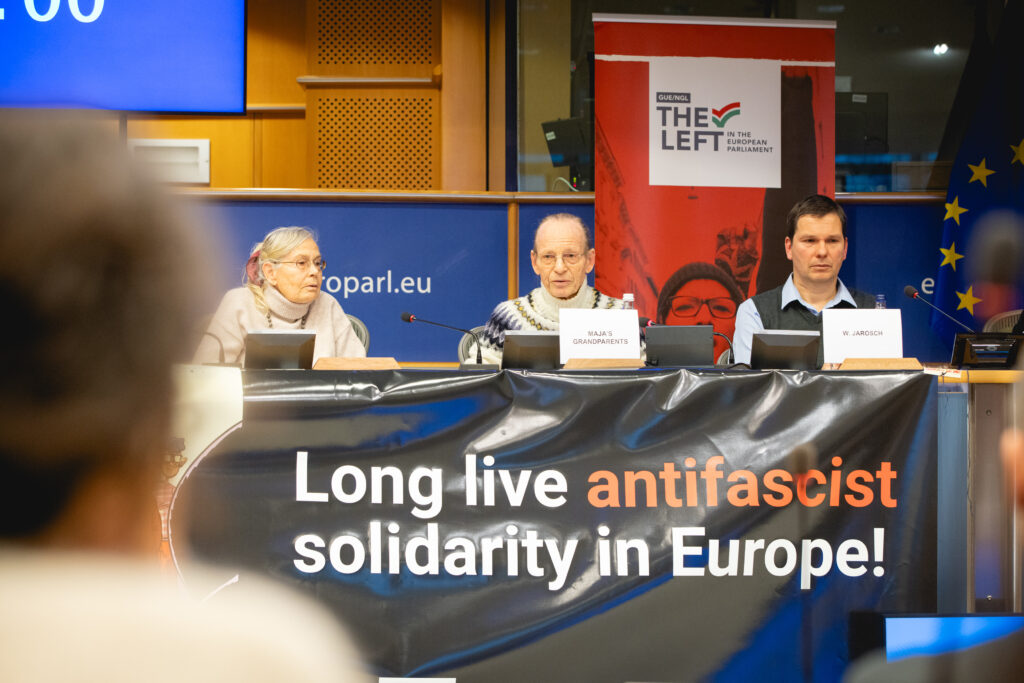Brussels – Zerocalcare at the European Parliament to talk about anti-fascism. It happened today (Dec. 11) at an event organized by The Left group where the cartoonist from Rome presented his latest work, dedicated to the story of Ilaria Salis. In addition to the Left and Green Alliance (AVS), MEPs, relatives, and lawyers of other anti-fascist activists imprisoned not only in Hungary but also in France and Germany also spoke.
Today’s event focused on what the radical left considers the political persecution of anti-fascist activists and their criminalization by the forces of the European far right. Starting with Fidesz, the party of Hungarian Prime Minister Viktor Orbán around which the Patriots (PfE) group in the European Parliament has formed, and the story of Ilaria Salis, whose court case has been described as the paradigm of an essentially reactionary political process.
Salis, who attended the event, bluntly said that “under Orbán‘s illiberal and authoritarian government, where the judiciary is influenced by political power, the conditions do not exist for anti-fascists to face a fair trial that respects the rule of law.” Her story “has amply demonstrated that what is sought is not justice but exemplary punishment and political revenge,” she stressed.
The mediatization of the Salis case has been bolstered, among others, by cartoonist Zerocalcare, the pen name for Michele Rech, with “This Night Will Not Be Short,” a work that he described as a collection – or better a “collective,” as the author clarified – conceived “to keep the spotlight” on her story, which came to the forefront of local news in December 2023 when she was conducted in a Hungarian courtroom with shackles and handcuffs in plain sight.
Left co-president @schirdewan opened the event on Criminalization of Antifascism by underscoring the importance of unconditional defence of democratic values and equality.
“Fascism is not an opinion or a choice, it’s a crime against humanity.” #We are allantifascists pic.twitter.com/wFrGDHkUqG
— The Left in the European Parliament (@Left_EU) December 11, 2024
According to Rech, this violated “European legal civilization,” whose cornerstones, he pointed out, include the presumption of innocence until proven guilty. Yet, with the trial still ongoing – as of today, the first instance has not yet been concluded – for the Hungarian press, “Ilaria was already a criminal. She was convicted even before a sentence.” Another aspect on which Zerocalcare and colleagues focused heavily was the lack of proportionality of the penalties proposed by the prosecution: up to 25 years in prison for light injuries (for which the victims did not even file a complaint).
Through anecdotes related to his experience in Hungary supporting Salis, Rech also denounced “a context of absolute complicity between the police and neo-Nazis,” praising the great “positive wave” of solidarity in Italy that later led to the woman’s election from the ranks of AVS. However, regarding the reception of the story in Italy, the author pointed out that there is “a cultural battle to fight,” whereby (partly due to the two decades of Berlusconism) many citizens “think that prison living conditions are unacceptable only if one is innocent, while if one is guilty, they deserve everything.” An argument, he noted, that blatantly conflicts with the principles underlying the rule of law and the protection of human integrity.
Hungarian authorities asked the European Parliament to revoke parliamentary immunity for Salis in October. The legal services of the House’s legal committee are currently examining the application: if it passes, Salis’s lawyer, Matteo Zamboni, explained to Eunews, it will then be up to the plenary to rule on whether to proceed with the revocation. The process is likely to take several months.
However, there are at least two other cases in which politics instrumentalized the Hungarian judiciary, at least according to The Left. The first is Rexhino Abazaj, known as Gino, a 32-year-old Albanian citizen, Italian without citizenship, arrested in Paris, where he awaits the decision of judges on his transfer to Hungary. The other is Maja T., a 23-year-old German non-binary activist, who was arrested in Berlin and extradited to Budapest after a detention in Dresden.

The common thread linking these three stories is the participation in an anti-fascist demonstration in the Hungarian capital in February 2023, held in protest against a parallel march of right-wing extremists held each year on the so-called “Day of Honor,” a celebration in memory of collaborators of Nazi Germany and the 1945 siege of Budapest.
Advocating Maja’s cause at the European Parliament were his father and grandparents, who recounted the brutal methods used by law enforcement and security forces during the various stages of detention — from arrest to incarceration, including the transfer from Berlin to Dresden and finally to extradition: handcuffs and shackles, armored vehicles, roads closed to traffic, and a covered face, all measures befitting the most dangerous terrorists.
According to the father, extradition to Hungary “constitutes a violation of the rule of law,” considering particularly the detention conditions in the country’s prisons (recently condemned also by the Council of Europe), which allegedly breach the prohibition of torture (e.g., through constant observation, day and night, of Maja and the almost-constant solitary confinement imposed over the past six months) and by allowing, among other things, discrimination against members of the LGBTQ+ community.
“Therefore, the extraditions of anti-fascists to Hungary must be stopped immediately” since “it is clear” that in the central European country, “justice is not sought but only political revenge,” is this the appeal of Salis, her colleagues, and Zerocalcare. For the Left’s co-leader in the House, Martin Schirdewan, “Hungary is a corrupt country that violates fundamental human rights as well as freedom of the press.”
English version by the Translation Service of Withub






